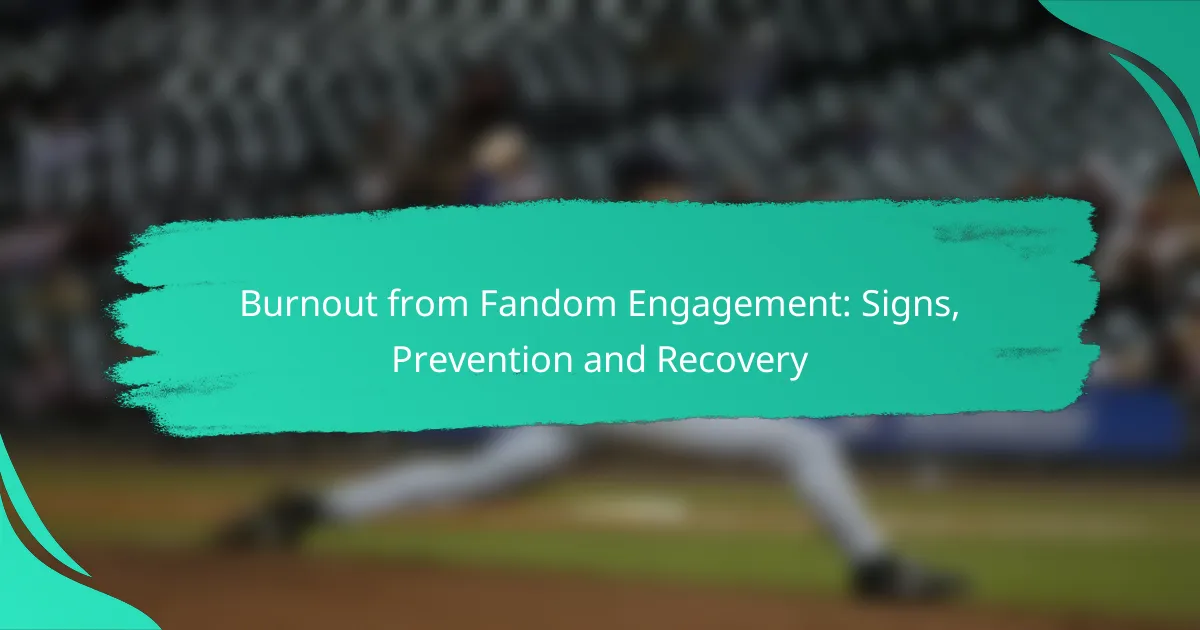Burnout from fandom engagement can lead to emotional and physical exhaustion, making it essential to recognize the signs early. By implementing preventive measures such as setting boundaries and prioritizing self-care, individuals can maintain a healthier relationship with their passions. If burnout does occur, effective recovery strategies like taking breaks and reconnecting with original interests can help restore enthusiasm and well-being.
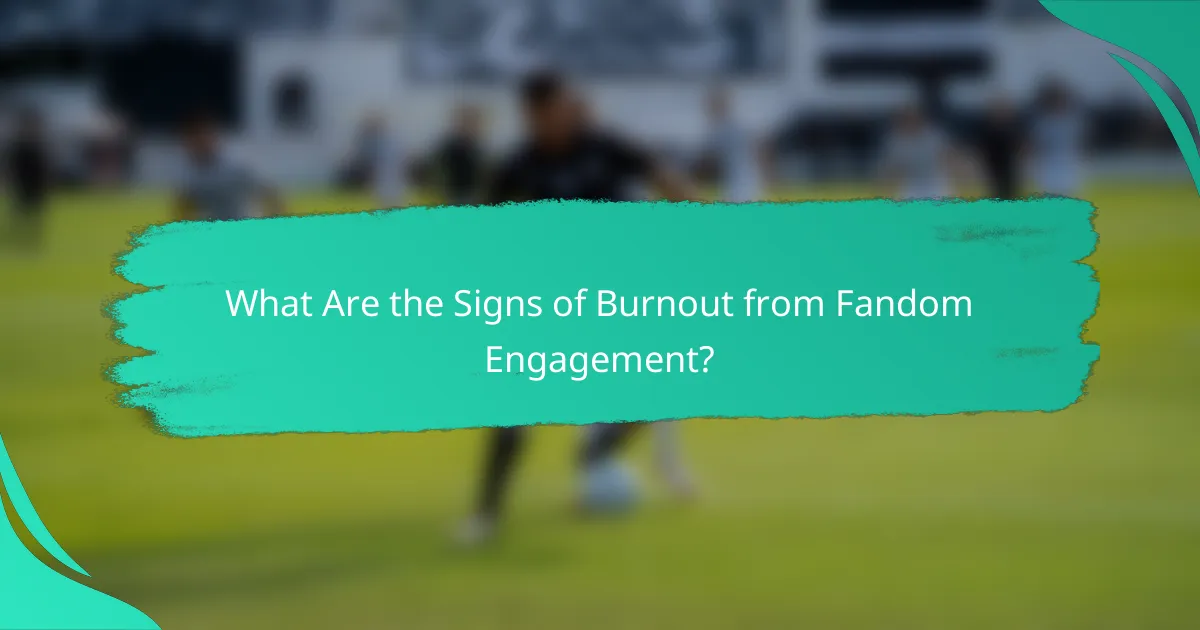
What Are the Signs of Burnout from Fandom Engagement?
Burnout from fandom engagement can manifest through various signs that indicate emotional and physical fatigue. Recognizing these signs early can help individuals take steps to prevent further deterioration of their well-being.
Emotional exhaustion
Emotional exhaustion is a primary sign of burnout, characterized by feelings of being drained and overwhelmed. Fans may find themselves feeling apathetic towards their favorite shows, games, or communities, leading to a lack of enthusiasm.
This state can result from constant engagement without adequate breaks, making it essential to monitor emotional responses to fandom activities. Taking regular time off can help recharge emotional batteries.
Reduced interest in fandom activities
A noticeable decline in interest in previously enjoyed fandom activities is another key indicator of burnout. Individuals may stop participating in discussions, attending events, or engaging with content they once loved.
This shift often stems from feeling pressured to keep up with trends or community expectations. Setting personal boundaries and allowing for a flexible engagement schedule can mitigate this issue.
Increased irritability
Increased irritability can surface as a response to the stress associated with fandom engagement. Fans may become easily frustrated with others or with the content itself, leading to conflicts within communities.
Physical symptoms
Burnout can also manifest through physical symptoms like fatigue, headaches, or sleep disturbances. These symptoms often arise from prolonged stress and lack of self-care.
Maintaining a balanced lifestyle that includes regular exercise, proper nutrition, and sufficient sleep can help alleviate these physical effects. Listening to your body is crucial in recognizing when to take a break.
Social withdrawal
Social withdrawal is a common response to burnout, where individuals may isolate themselves from friends and fandom communities. This can lead to feelings of loneliness and exacerbate the sense of disconnection.
To combat social withdrawal, it’s important to reach out to supportive friends or fellow fans, even if it feels challenging. Engaging in small, low-pressure interactions can help rebuild connections and foster a sense of belonging.
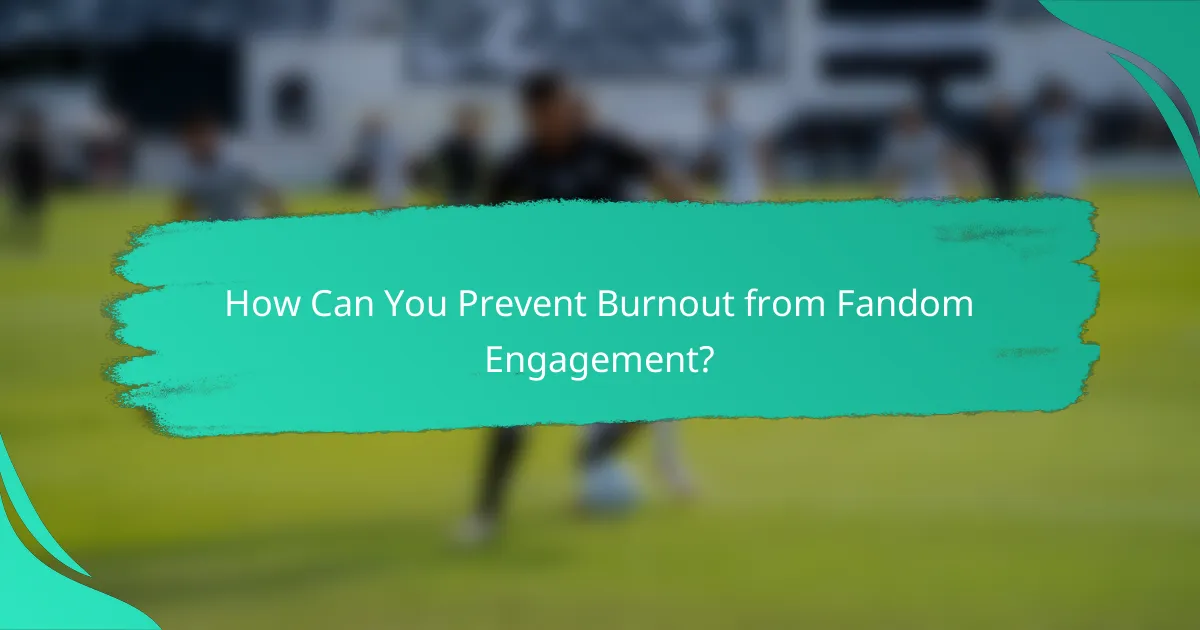
How Can You Prevent Burnout from Fandom Engagement?
Preventing burnout from fandom engagement involves establishing clear limits, diversifying your interests, prioritizing self-care, and connecting with supportive communities. By taking these proactive steps, you can maintain a healthy balance between your passions and personal well-being.
Set healthy boundaries
Setting healthy boundaries is crucial in managing your time and energy within fandoms. Determine how much time you can realistically dedicate to fandom activities each week without feeling overwhelmed. For instance, limit social media engagement to a specific time frame each day.
Communicate your boundaries with others in the community. Let friends know when you need a break or when you’re unavailable for discussions. This helps manage expectations and reduces pressure to constantly engage.
Engage in diverse interests
Engaging in diverse interests outside of your fandom can help prevent burnout. Explore hobbies that excite you, such as sports, arts, or reading different genres. This variety can refresh your perspective and provide a necessary break from fandom-related activities.
Consider setting aside time each week to pursue these interests. For example, you might dedicate weekends to outdoor activities or creative projects. This balance can enhance your overall satisfaction and reduce the risk of feeling trapped in a single focus.
Practice self-care
Practicing self-care is essential for maintaining mental and emotional health while engaging in fandoms. Incorporate regular activities that promote relaxation and well-being, such as exercise, meditation, or spending time in nature. These practices can help recharge your energy levels.
Establish a self-care routine that fits your lifestyle. This could be as simple as taking a walk daily or setting aside time for a favorite book. Prioritizing your well-being will help you enjoy your fandoms more fully without feeling drained.
Seek community support
Seeking community support can provide a valuable outlet for discussing feelings of burnout. Connect with fellow fans who understand your experiences and can offer encouragement. Online forums, social media groups, or local meetups can serve as platforms for sharing and support.
Don’t hesitate to express your feelings within these communities. Many fans have faced similar challenges and can offer advice or simply lend an ear. Building these connections can help you feel less isolated and more engaged in a healthy way.
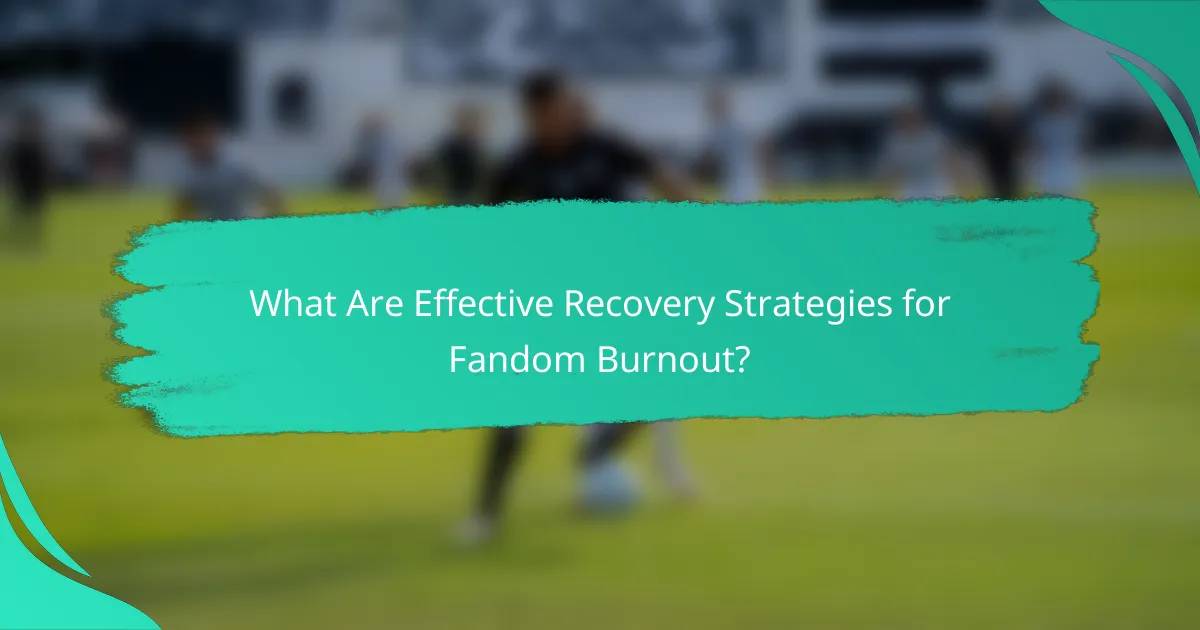
What Are Effective Recovery Strategies for Fandom Burnout?
Effective recovery strategies for fandom burnout include taking intentional breaks, reconnecting with original interests, establishing a balanced schedule, and considering professional help if needed. These approaches can help restore enthusiasm and prevent future burnout.
Take a break from fandom activities
Taking a break from fandom activities is crucial for recovery. This pause allows you to step back, reflect, and recharge without the pressure of constant engagement. Aim for a break of at least a few days to a couple of weeks, depending on your level of burnout.
During this time, avoid all fandom-related content, including social media, fan forums, and merchandise. This distance can help you regain perspective and reduce feelings of obligation.
Reconnect with original interests
Reconnecting with original interests can reignite your passion and provide a refreshing change. Explore hobbies or activities you enjoyed before diving deep into fandom, such as reading, sports, or arts and crafts. This shift can help you rediscover joy outside of fandom.
Consider setting aside specific times each week to engage in these original interests. This practice not only diversifies your activities but also helps maintain a healthy balance in your life.
Establish a balanced schedule
Establishing a balanced schedule is essential for preventing burnout. Create a routine that includes time for fandom activities, personal interests, work, and relaxation. This balance ensures that no single aspect of your life overwhelms you.
Use tools like planners or digital calendars to allocate specific time slots for each activity. Aim for a mix of fandom engagement and downtime, ensuring that your schedule reflects your overall well-being.
Consider professional help
If feelings of burnout persist despite your efforts, consider seeking professional help. Therapists or counselors can provide valuable support and strategies tailored to your situation. They can help you explore underlying issues contributing to your burnout.
Look for professionals who specialize in mental health and are familiar with fandom culture. This understanding can enhance the effectiveness of the support you receive, making it more relevant to your experiences.
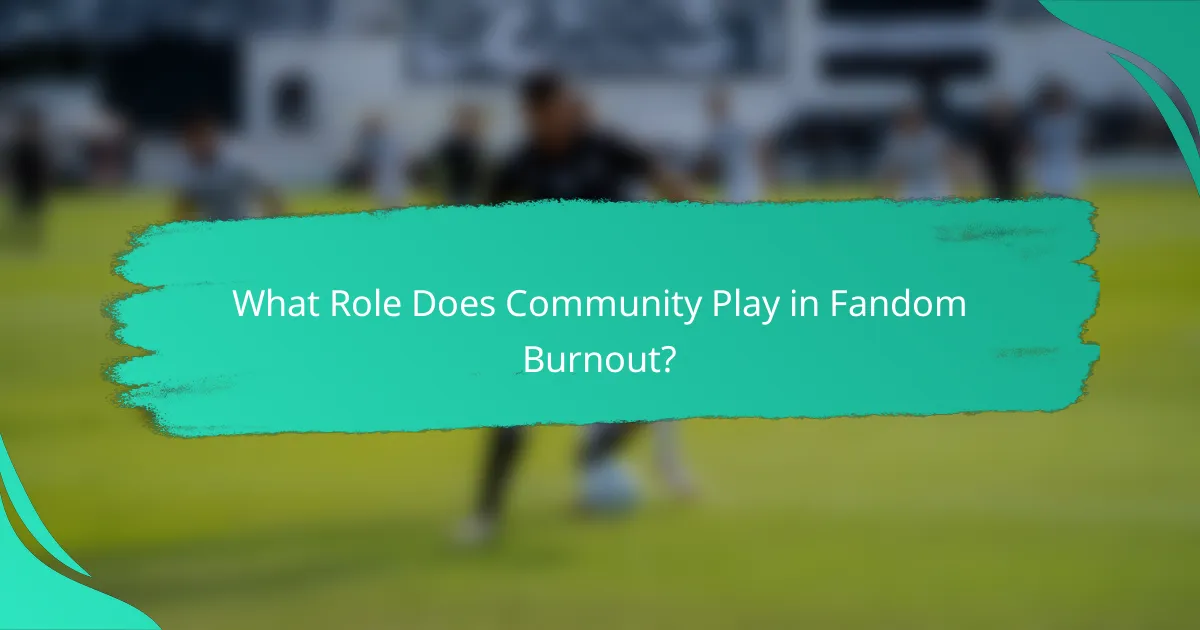
What Role Does Community Play in Fandom Burnout?
Community plays a significant role in fandom burnout, as it can provide both support and pressure. While a strong community can enhance enjoyment, it can also lead to overwhelming expectations and emotional exhaustion if not managed properly.
Support networks
Support networks within fandoms can be crucial for maintaining mental health. These networks often consist of friends, online groups, or local meetups where fans share their interests and experiences. Engaging with supportive individuals can help mitigate feelings of isolation and stress.
To foster a healthy support network, prioritize interactions that uplift rather than drain you. Set boundaries around your participation to avoid overcommitment, and remember that it’s okay to step back when needed.
Shared experiences
Shared experiences in fandoms can create a sense of belonging, but they can also lead to burnout if they become too consuming. Fans often bond over events, discussions, or shared content, which can enhance enjoyment but may also create pressure to constantly engage.
To balance shared experiences, consider diversifying your activities within the fandom. Engage in different aspects, like creating content or exploring new themes, to keep your interest alive without feeling overwhelmed. Regularly assess your engagement level and adjust as necessary to maintain a healthy relationship with your fandom.
